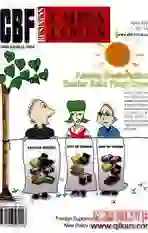Is This Just a Beginning?
2009-06-15
Though Chinas macro-economic data of January and February has seen betterment, the report from Peoples University of China doesnt consider it a signal of recovering economy.
The School of Economics of Peoples University of China issued Chinas macro-economic report of the first quarter, 2009 on March 20, 2009. The report said that the bettering data was not a signal of recovering economy because exportation and consumption still portrait the heroesof Chinas demand; however, the small rise in economy, which is driven by the government investment, can not change the trend of the continuous decline of Chinas macro-economy. According to the report, the periodic decline of Chinas macro-economy has just begun. The so-called rebound is unavailable right now.
The bettering data in industry is mainly attributed to, on the one hand, the economic stimulus policies; on the other hand, it is also resulted from the excessive stock adjustment last year. The rebound of the industry has neither solid demand foundation nor the applicable structure support. Therefore, it can not function to start the overall rebound of Chinas economy.
The judgment mentioned above mainly comes from the aspects like the following:
One, the decline trend of economy, which started in the second half of 2008, will be continued in the first quarter of 2009 and the potential GDP gap will be further enlarged. The growth rate of GDP will decrease. The demand falls drastically while the potential production capacity amplifies continuously, resulting in the long time of the periodic adjustment.
Two, the world economy is declining at a high speed out of expectation. Chinas foreign trade has seen a further decrease. The financial crisis has begun to bring more impact on the real economy of China. The increasing trend of the foreign trade surplus may be overturned.
Three, the financial crisis has lowered peoples consumption confidence because they no longer see fast increase in their incomes. In addition to the falling macro-economic climate, the growth rate of consumption has been lowered. The macro-economic decline has begun to be embodied in the consumption field instead of the export and investment field. That means the determined consumption goal is hard to be realized in the future.
Four, the growth rate of fixed investment increases a little because of the stimulus from the short-term investment policies. However, the government investment does quite little favor to driving the non-government investment, which means the effect of the financial stimulus package in the depression period may not be so good as expected.
Five, the growth rate of value-added of industry has already rallied, but such a rally has not solid foundation, because the Chinese Spring Festival played a great role in it. Without further stimulus and effective structure support, the rally can not last long.
Six, the Purchasing Manager Index has a rebound from a low-level base. The macro-economic stimulus package has seen its initial effect. But the process of de-inventory has not ended; the problem of excessive production capacity has not been truly solved. The manufacturing industry faces the danger of excessive adjustment.
Seven, the problem of labor force has become more and more serious. The unemployment may seriously hit Chinas social structure, which has always been fragile. According to the estimation, there may be 35 million unemployed people in China in 2009. This will bring about great challenges to China which lacks systematic and comprehensive social security network.
Eight, the general financial situation will be deteriorating in 2009, especially when there is deflation happening. The growth rate of financial income may not be so high as expected. Nevertheless, the deteriorating financial situation may not be shown in central government; instead, it will be embodied in the local governments, which will cause problems in the implementation of central governments macro-economic adjustment policies.
Nine, various price indexes have seen obvious decrease. The CPI and PPI also have had negative increase and the stress of deflation increases a lot.
Ten, though there is fast increase in the broad money (M2) and credit issuance, the gap between the growth rates of M2 and M1 money hits the historical high. This means the Chinese people prefer the fixed deposit and the deposit amount is likely to increase. The market players have weaker will of investment and consumption.
According to the report, currently China has to face the problems of deteriorating foreign economic environment, the continuous depression of the domestic pillar industries, the uncertainty of the effect of its economic stimulus policies and less strong ability to withstand the impact from the macro-economic fluctuation. All these factors determine that the economic periodic adjustment will be long and uncertain.
